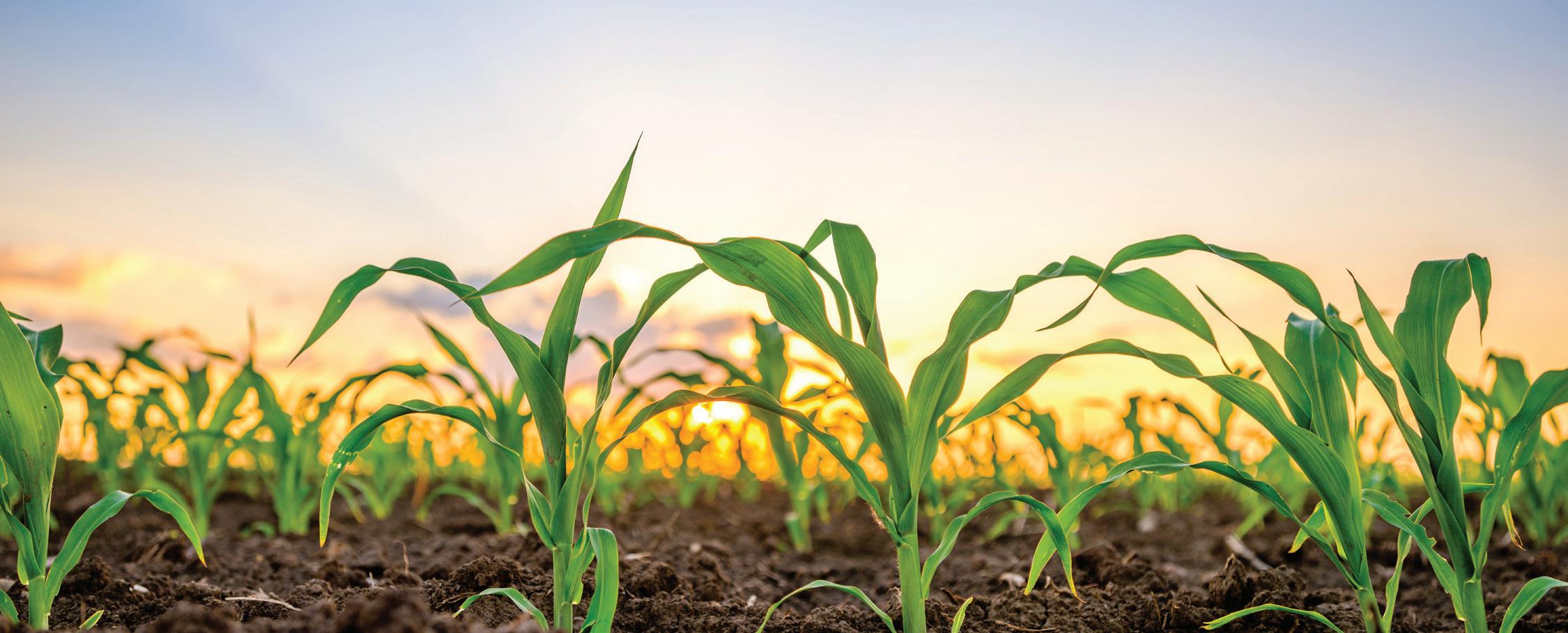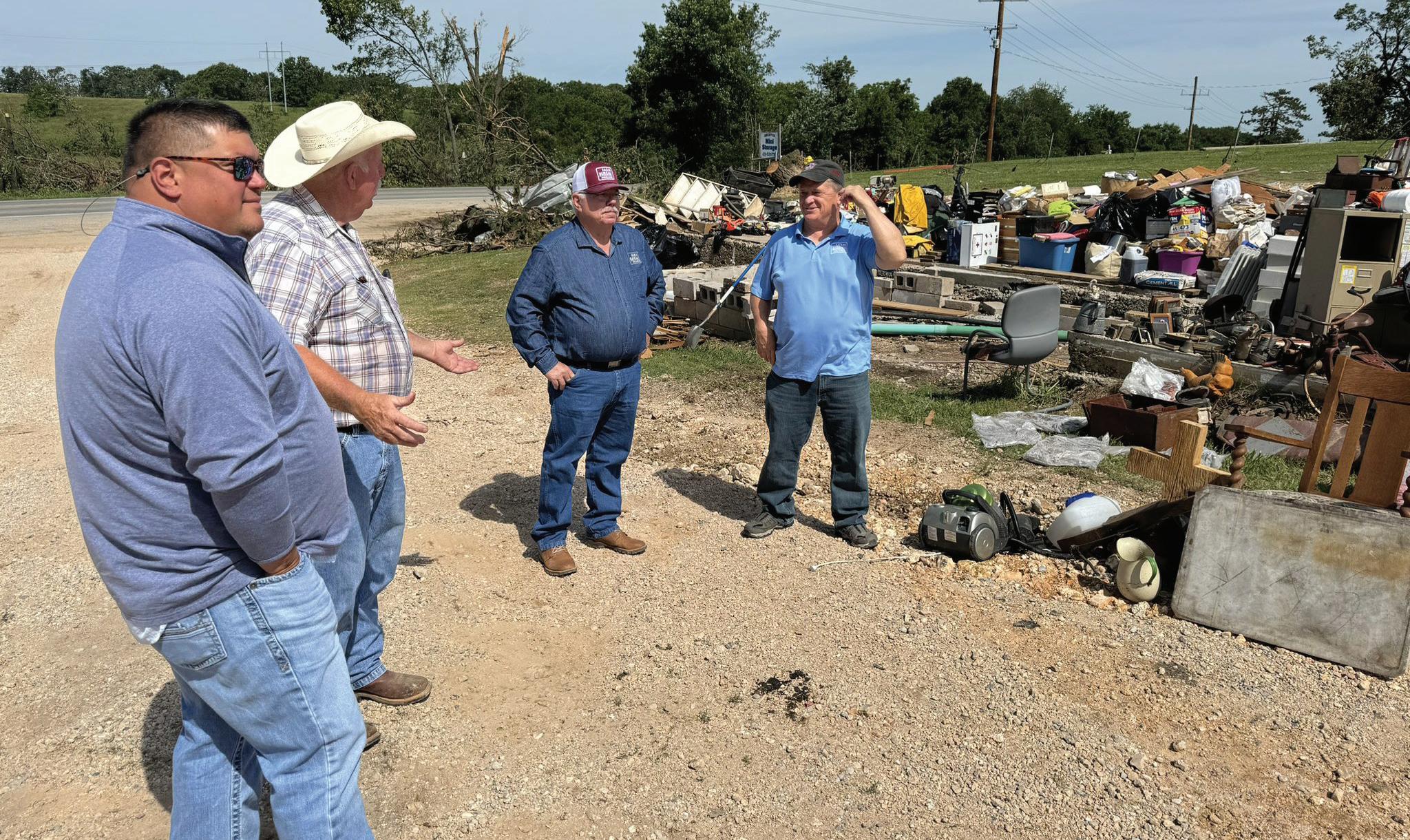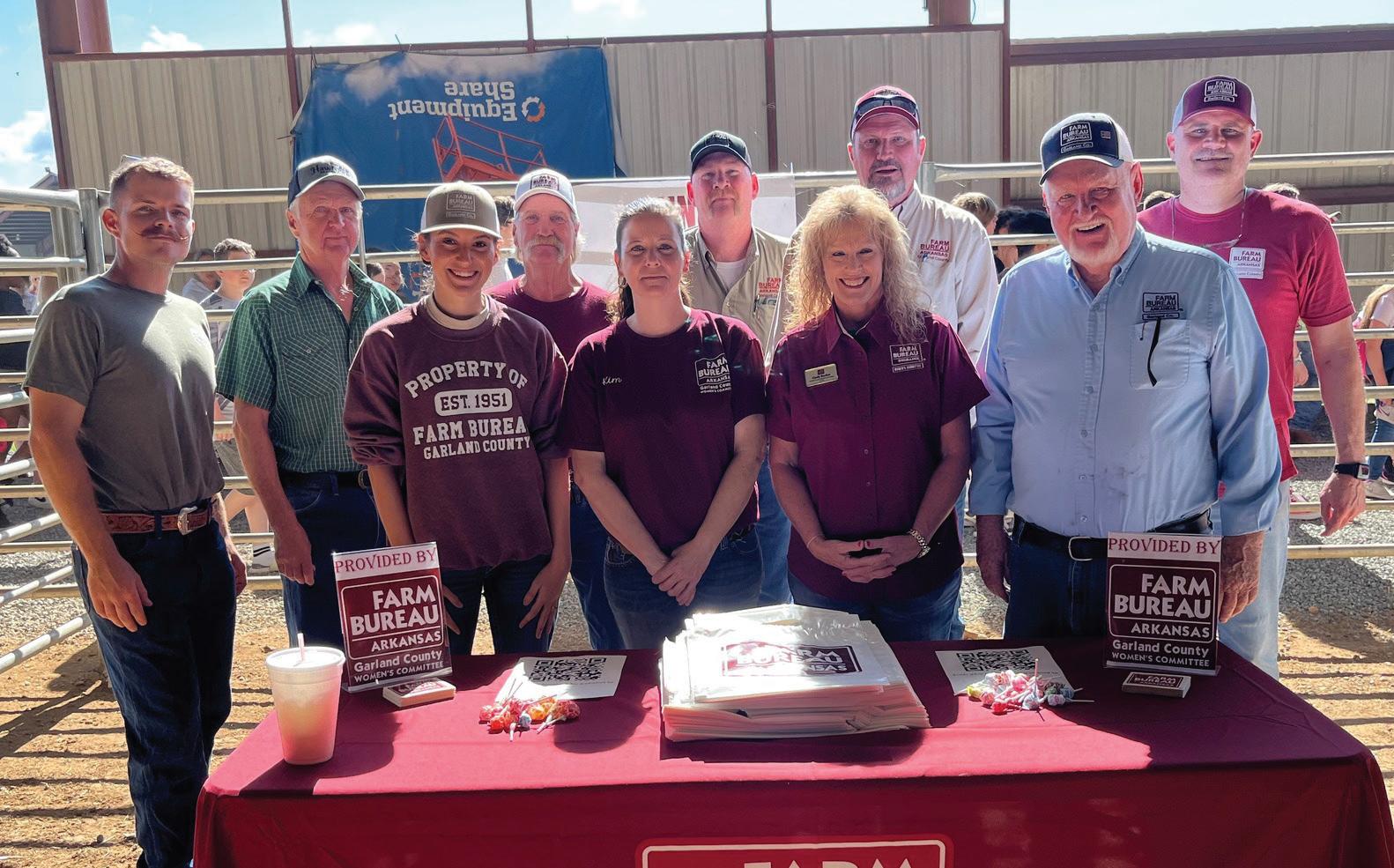Farm Bureau Press


A r FB SELECTS SUMMER INTERNS
Arkansas Farm Bureau (ArFB) has named two college students for summer internships across the organization. The purpose of the internship program is to expand professional skills while gaining experience with the advocacy work done by the organization on behalf of the state’s agriculture industry and rural communities.
Spencer Knight, a Little Rock native, will focus on organization and member programs, legislative affairs and youth leadership programs. Knight is a senior studying agricultural management and marketing at the University of Arkansas.
Delaney Stephens, a Prairie Grove native, will work within the organization’s Public Relations department, focusing on digital content generation as well as other communications projects. Stephens is a senior at the University of Arkansas, studying agricultural communications with a minor in agricultural leadership.


Delaney Stephens


MAY 31, 2024 | VOLUME 27 | ISSUE 11 A PUBLICATION OF THE ARKANSAS FARM BUREAU FEDERATION
A PEEK INSIDE
Chad Hooten Wins American Farm Bureau Award, Page 2
Market News, Page 4
Storm Damage | Arkansas Farm Bureau Federation state board members and staff, including President Dan Wright and Executive Vice President Jarrod Yates, delivered supplies and touring farm damage in Northwest Arkansas May 29.
the QR code to access direct links referenced in each article. GET THE LINKS
Scan
FOLLOW US ONLINE
Spencer Knight
CHAD HOOTEN WINS AMERICAN FARM BUREAU AWARD
Chad Hooten, public relations specialist for Arkansas Farm Bureau, was recognized recently for the top Audio News Story, Feature Story or Commentary/ Editorial in the American Farm Bureau’s Communications Awards Contest.

The winners were announced as part of the American Farm Bureau’s annual Communications Conference, held this year at the Texas Farm Bureau headquarters in Waco. Hooten’s winning entry was for the initial episode of the AgriCulture podcast, which focused on the history and


Garland Co. Ag Day | Garland Co. Farm Bureau recently hosted its first Intro to Ag Day. Students were provided with the opportunity to learn about agriculture as well as careers in agriculture, including forestry, welding, FFA, farm-to-table products, how to milk a cow, and much more. Garland Co. Farm Bureau board members, county members and Women’s Leadership Committee (WLC) members all participated in the event. Members included (top photo, from left) Jack Meredith, member; Carl Hawthorn, member; Abby Meredith, board member; Phillip Martin, board member; Kim Suit, member; Tony Suit, board vice president; Cindy Rucker, WLC chair; Keith Rucker, board president; Marion Fletcher, board secretary/ treasurer; Scott Jones, agency manager.
emotion surrounding the issue of possible redesignation of the Buffalo River, with Farm Bureau policy as the central message. Current Farm Bureau policy states: “We oppose the changing of the name, designation or expansion of the Buffalo National River and any further negative impact on the agriculture lands or infringement on private land ownership and its use within the Buffalo National River watershed.”
Sixteen different states earned awards in the contest, which recognizes state Farm Bureau professionals from across the country for their work in communications in the areas of writing, print, media relations, social media, graphic design, video, audio and website.
Hooten has worked at ArFB since September 2022, providing digital content for several ArFB communication outlets. Prior to joining ArFB, Hooten spent 30 years guiding the Hooten’s Publishing business.
You can access all Arkansas Farm Bureau podcasts online.


Disaster Relief Kits | Federation employees gathered at the state office to assemble disaster relief kits provided by the ArFB Foundation for counties affected by the recent severe weather. More than 100 kits were delivered May 29 to Benton and Madison counties with other kits allocated for other counties. The kits included a safety vest, leather gloves, safety glasses and ear plugs, and will be provided to those assisting storm clean up.
2 A PUBLICATION OF THE ARKANSAS FARM BUREAU FEDERATION
Chad Hooten
HOUSE AG COMMITTEE PASSES FARM BILL
On May 24, the House Committee on Agriculture passed the Farm, Food and National Security Act of 2024, its version of the 2024 farm bill. Farm Bureau supports the bill, as it addresses many priority policy issues important to our members.
Key Provisions
Farm Bureau policy supports higher statutory reference prices (SRP) and higher marketing loan rates (MLR) to more accurately reflect the cost of production. Since the current reference prices were established in the 2024 bill and were unchanged in the 2018 bill, the average cost of production across program crops has increased over 30%. The tables below use data from the University of Arkansas Division of Agriculture Enterprise Budgets to show the dramatic increases in cost of production for Arkansas producers.
The bill continues both the Price Loss Coverage (PLC) and Agriculture Risk Coverage (ARC) programs, along with the marketing loan program. It includes a 10%-20% increase in statutory references prices (SRP) for all covered commodities. The maximum effective reference price is also increased due to the increase in the SRP. A modest increase in marketing loan rates (MLR) is also included in the bill.
with more than 75% of their income from agriculture, and indexes payment for inflation.
• The adjusted gross income limit of $900,000 is unchanged and does not apply for disaster programs in Title 1 and the Non-Insured Crop Disaster Assistance Program for producers with more than 75% of their income from agriculture.
• Improvements to dairy programs that will provide more support for farmers.
• Improvements to standing disaster programs that should provide access to more producers.
• Enhancements to the conservation programs through reallocation of Inflation Reduction Act conservation funds to existing working-lands programs like the Environmental Quality Incentives Program (EQIP), The Conservation Stewardship Program (CSP), and the Regional Conservation Partnership Program (RCPP).
• Funding for the Market Access Program (MAP) and the Foreign Market Development Program (FMD) is doubled.
Other Farm Bureau priorities that are addressed:
• An annual election between ARC and PLC.
• An increase in the ARC guarantee to 90% of the benchmark revenue for both ARC-IC and ARC-CO.
• An increase in the maximum payment rate for ARC-IC and ARC-CO to 12.5% of benchmark revenue.
• Adds up to 30 million base acres for farms where planted acres exceed base acres on the farm.
• Increases the payment limit to $155,000 for producers
Sen. Debbie Stabenow (D-Mich.), Chair of the Senate Committee on Agriculture, Nutrition, and Forestry, has released some details from her farm bill proposal. It includes a 5% increase in the SRP for a few commodities that have not seen an increase in their effective reference price. That would increase rice to $14.70/cwt and seed cotton to $0.385/lb. The bill would also reduce the AGI to $700,000, and make tenants ineligible for participation if the landowner exceeds the AGI limit. This could result in many producers losing eligibility to participate in safety-net programs, even though they do not meet the AGI limit.
Sen. John Boozman (R-Ark.), Ranking member of the Senate Committee on Agriculture, has announced that he will provide his own framework soon, but also noted that the House bill accomplishes many of the priorities set by Senate Republicans.
Analysis by Brandy Carroll and Jake Cartwright. For more information, contact Brandy at (501) 228-1268, brandy.carroll@arfb.com or Jake at (501) 228-1475, jake. cartwright@arfb.com.
3 A PUBLICATION OF THE ARKANSAS FARM BUREAU FEDERATION
Current SRP New SRP Current MLR New MLR Rice $14.00 $16.90 $7.00 $7.70 Seed/Upland Cotton $0.37 $0.42 $0.45-$0.52 $0.55 Soybeans $8.40 $10.00 $6.50 $6.82 Corn $3.70 $4.10 $2.20 $2.42 Wheat $5.50 $6.35 $3.38 $3.72 Peanuts $535 $630.00 $0.1775 $0.1950
Commodity
MARKET NEWS
as of May 29, 2024
Contact Brandy Carroll brandy.carroll@arfb.com
Tyler Oxner tyler.oxner@arfb.com
Corn
After reaching a four-month high in mid-May, corn prices fell below $4.70 on the September 2024 contract. Support for the September and December 2024 contracts appears to be at the 50day moving averages of $4.62 and $4.76, respectively. Last week’s price increase, driven by higher wheat prices and weather news, has lost momentum. However, potential support for corn prices could come from the Corn Belt’s expected rainfall, which might prevent corn plantings from reaching 90 million acres in 2024. Notably, corn prices typically rally in May and June, often peaking in the third week of June.
Soybean
November soybeans have dropped from their highest price in five months due to concerns that plantings may exceed the USDA’s early estimate of 86.5 million acres. Nearby support remains at $12, while resistance is around the 200-day moving average of $12.29. Despite a bearish sentiment among traders, the trend for November soybeans is still upward. Planting progress shows soybeans at 68%, which is 5% above the fiveyear average, with Arkansas and Mississippi leading at 88% and 92% planted, respectively. A warmer, drier outlook for Brazil will allow farmers to finish their harvest and better evaluate production losses from recent flooding.
Wheat
Chicago and Kansas City July 2024 contracts both reached nine-month highs before pulling back. Nearby support for July 2024 is at last week’s low of $6.82. Concerns about dry wheat conditions in Ukraine and southern Russia continue to support prices. The International Grains Council forecasts a 6% decline in Russia’s wheat output this year. Meanwhile, U.S. wheat stocks are expected to increase for the second consecutive year, up 11% from last year and reaching a four-year high. Wheat exports are projected to total 775 million bushels, an increase of 55 million bushels and the largest in three years, as U.S. prices are expected to be more competitive globally. The season average farm price is estimated at $6, down $1.10 from the previous season. Wheat condition ratings fell by one point to 48% good to excellent, still the best since 2021.
Rice
This week’s crop progress report shows rice conditions continue to be strong, with 80% of the crop rated as “good/excellent” and only 3% as “poor/very poor,” a slight downgrade from the previous week. In Arkansas, 78% of the crop is rated “good/excellent.” The September rice chart has pulled back slightly after reaching a recent high of $15.80, which now acts as resistance. On Wednesday morning, the chart gapped lower, touching the 20-day moving average. If support holds at this level, prices are likely to fill the gap most of the time.
Cotton
Cotton prices have seen positive movement over the past week due to fund short covering and active U.S. cotton purchases by China. After hitting an 18-month low of 73.75 on May 15, the December 2024 contract increased its trading limit
from 300 to 400 points last week and is now approaching 80 cents, which appears to be resistance. Some traders believe prices are moderately overbought, while others are looking to book profits as the month ends. Crop progress is better this year, with 59% of the crop planted, 3% more than last year at this time and 2% above the five-year average. In Arkansas, 86% of the crop has been planted, 4% lower than last year but 4% above the fiveyear average.
Livestock
Last week, July hogs fell below the 0.618 retracement of their rally and the 200-day moving average, marking bearish technical action. As future prices cannot find sufficient buying interest to support the market. However, traders may hesitate to push prices lower after four consecutive weeks of decline. The Commitments of Traders report showed managed money traders reduced their net long positions by 12,631 contracts to 43,497, the lowest since Feb. 13. The Cattle on Feed report was neutral, with numbers aligning with expectations. New bird flu concerns arose as USDA detected virus particles in a slaughtered dairy cow, preventing affected meat from entering the food supply. However, strong demand should keep packers aggressive with slaughter and buying in the country. This will give feedlots confidence to hold for higher cash again this week. Cash live cattle prices ended last week about $2/cwt higher, with a five-day, five-area weighted average price of $190.24, up from $188.31. EDITOR
Ashley Wallace ashley.wallace@arfb.com
4 A PUBLICATION OF THE ARKANSAS FARM BUREAU FEDERATION











